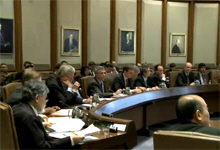
Typical street scene in Santa Ana, El Salvador. (Photo: iStock)
IMF Survey: After Financial Crisis, IMF Reviews How It Assesses Risks
March 24, 2011
- IMF reassessing how it analyzes risks, economic prospects
- Review will include evenhandedness, effectiveness of IMF surveillance
- Assessment of how systematically important economies are monitored
- Outside experts will play key part in review
The IMF is taking a new look at how it assesses risks and prospects for economies around the world in the wake of the global economic crisis, reviewing the effectiveness of its monitoring and the coverage, candor, and evenhandedness of its reports.

IMF Executive Board in session: surveillance review will draw on views of country authorities, civil society, Board members (photo: IMF)
TRIENNIAL SURVEILLANCE REVIEW
In the process, it will look at ways to strengthen assessments of the advanced economies in which the global financial crisis originated.
The IMF regularly gives economies around the world at the country, regional, and global level a health check and provides policy advice through a process known as surveillance, publishing reports on its findings after consultation with country or regional authorities. The aim is to identify weaknesses that need addressing and possible risks for regional or global stability.
Over the past three years, the IMF has worked to assist its 187 member countries in addressing the repercussions of the global financial crisis while also tackling gaps in its surveillance framework laid bare by the crisis.
The IMF reviews the effectiveness of its surveillance work every three years, but this time is particularly important because of lessons to be learned from the global economic crisis.
The internal review is proceeding against the backdrop of a series of landmark reforms at the IMF since the crisis, in particular to modernize its surveillance, strengthen its lending toolkit, and to improve its governance structure by giving greater representation to dynamic emerging markets and a bigger voice to the poorest developing countries whose voting shares are also being preserved.
“Speak truth to power”
A recent report by the IMF’s Independent Evaluation Office (IEO) said that the Fund had not provided clear warnings about the buildup of vulnerabilities and risks associated with the impending crisis before its outbreak. This was in line with an earlier study by Fund staff. The IMF has since taken steps to address pre-crisis weaknesses.
The IEO report recommended that the IMF should create an environment that encourages candor and considers dissenting views; modify incentives to “speak truth to power;” better integrate macroeconomic and financial sector issues in its surveillance; overcome what it saw as a silo mentality and insular culture at the IMF; and deliver a clear, consistent message on the global outlook and risks.
The new assessment, expected to be completed by September, will consider how well the Fund is positioned to detect and warn about the spectrum of economic and financial sector risks and ways they are transmitted, as well as how effectively the IMF is ensuring consistency and completeness across the various levels of surveillance (from bilateral to multilateral).
The review, to be discussed by the IMF Executive Board, will also assess the candor and evenhandedness of IMF surveillance—including surveillance of systemically important countries. Building on the recent proposals of the IEO, it will consider possible recommendations.
Sharpening focus, broadening analysis
Since the last assessment in 2008 and a number of other proposals, the IMF has taken several steps to sharpen its surveillance, including focusing on early warning signs and potential vulnerabilities. It has also begun to look at how the actions of big countries affect others--known as spillovers--and how to deal with financial crises after they take place.
Work on spillover reports is now under way for the five largest economies (the United States, Japan, China, the United Kingdom, and euro zone). The IMF has also made Financial Sector Assessment Reports mandatory for 25 major economies and financial sector expertise has been ramped up.
As part of the review, the IMF will draw on the views of country authorities, civil society organizations, and Executive Board members. Outside experts will also be consulted, particularly to assess financial sector crisis strategy and response, the crisis in the euro area, and the consistency of the Fund’s global and country-level surveillance tools. The review will make use of an external advisory group and a series of interviews to dig into early findings in more depth.
The IMF will also examine the legal framework for surveillance, including the 2007 Decision on Bilateral Surveillance, which will be conducted concurrently. It will consider the effectiveness of the current legal framework in supporting the role of Fund surveillance and options for reform.


